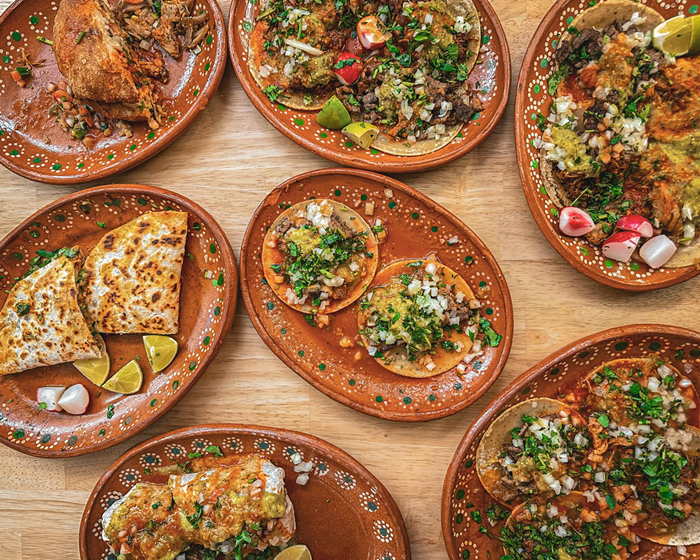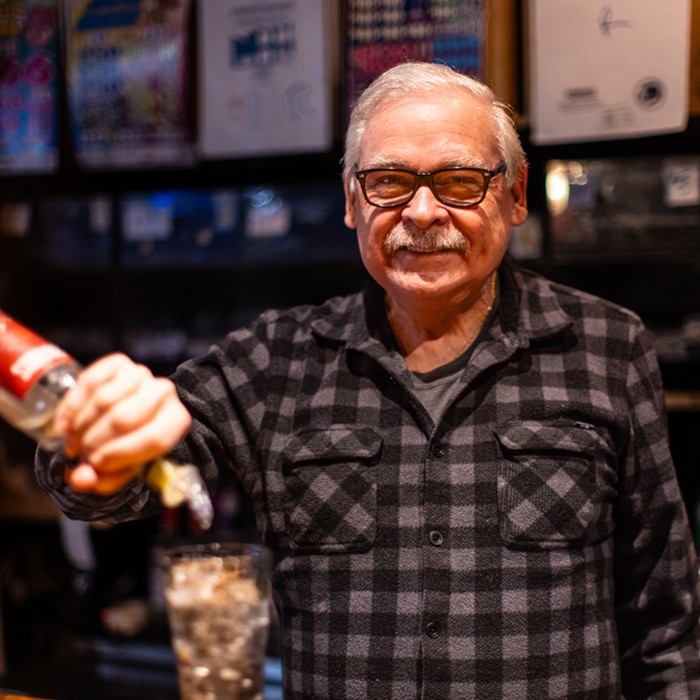The morning after my first meal at Sebi's Bistro in Eastlake, I found myself lying in bed thinking about pierogi—specifically the platter of pillowy, half-moon-shaped dumplings I had happily plowed through the night before. Seemingly every culture has its own version of fillings wrapped in dough, but I wanted to know more about these Polish treats.
According to The Oxford Companion to Food, "Poland has changed shape and size to a bewildering extent," which is a curious way to begin an explanation of a country's cuisine. But much of what was once Poland is now Russia, where the dumplings are known as pirozhki, the diminutive form of the word pirog, meaning pie.
Whatever their exact origins, the pierogi at Sebi's are as comforting a dish as you could ask for: boiled parcels of dough, their surfaces and edges uneven from being formed by hand, topped with diced onions that have been fried in a generous amount of butter. The potato-and-cheese-stuffed pierogi are lightened by the mild, pleasantly sour flavor of farmer's cheese, while the sauerkraut-and-mushroom-filled version is both tangy and earthy, with just the right amount of soft cabbage crunch.
Before I say anything else about Sebi's, there are two things I must get off my chest: First, the restaurant's decor is atrocious. Some of this cannot be helped—the dining room, housed on the first floor of the strange, putty-colored castlelike building just south of the University Bridge, is low-ceilinged and bisected by a series of ugly, unfortunate pillars. But there is no excuse for the abundance of black metal objects—lamps, candleholders, wall hangings—and scented candles (a crime in any restaurant, where you should only be smelling food, not soapy flowers and potpourri) burning amid a sea of highly-flammable-looking dark fabrics. Second, here in the Pacific Northwest, where delicious wild salmon, both fresh and frozen, is readily available year-round, Sebi's serves farmed Atlantic salmon. (It's almost certainly a cost-saving measure, but feels similarly inexcusable.)
But if you can get past these things, there's a lot to enjoy at Sebi's, namely kind and genuine service, a striking communal atmosphere, generous pours of Eastern European draft lagers, and huge portions of honest, home-style food.
Sebi's, named for chef and owner Kamila Kanczugowski's oldest son, Sebastian, offers two menus: one composed of pizza and panini, the other a specialty menu of Polish food. When I asked my charming, fast-talking waitress which one was better, she didn't hesitate to speak the truth.
"Polish," she said with a deadpan expression. "Without a doubt." Then, unprompted, she added, "I can't stop eating this food. I have it for lunch and dinner, and I take food home all the time, too. My aunt is the chef. And honestly, her food is better than my mom's."
Polish cuisine, born from a land that endures a harsh, northern climate, is not light. Jager schnitzel ($17)—pork loin pounded thin, then breaded and pan-fried—occupied the majority of the large plate it was served on. While tasty, the pork was a bit dry, and the "wild mushroom sauce" promised on the menu was neither made from wild mushrooms nor particularly saucy; instead, it was just sautéed button mushrooms. The highlights of the dish were the Silesian dumplings—plush and creamy, made from boiled potatoes and potato flour. (Silesia is a region of Central Europe located mostly in Poland, with parts in Germany and the Czech Republic.)
A platter of golabki ($11), or cabbage rolls, was similarly gigantic and filling: three cabbage leaves stuffed with a dense mixture of beef, rice, and smoky ground-pork kielbasa, topped with a tart, creamy tomato sauce. The rolls, like most of the restaurant's entrées, are served with house-made sauerkraut—finely shredded pickled cabbage flecked with bits of red bell pepper. While the condiment provides relief from such heavy food, Sebi's version is a bit sweet, more like bread-and-butter pickles than sour dills.
On Friday and Saturday nights, Sebi's serves up gypsy stew ($15), chunks of tender beef, mushrooms, and bell peppers long-simmered in a thick, smooth gravy. The stew—rich with flavor and luxurious in its simplicity—is served atop two slightly oily and delicious potato pancakes.
It's obvious that Sebi's functions as much as a community gathering space as a restaurant. It's a place where the staff, and many of their customers, slips easily between speaking Polish and English. On a recent Saturday night, three customers came in cheering and asking for "Mama." Kanczugowski came out of the kitchen in her chef's coat and apron and hugged each of them tightly. A cosmopolitan was ordered up for one of the ladies in the group. Suddenly, I felt as though I was in someone's aunt's house. I was tempted to raise my 20-ounce mug of Golden Pheasant beer—a fantastic Slovakian lager that's a bit sweet, with a dry, bitter finish (and a steal at just $6)—and yell "Cheers!" at anyone who would look at me.
The feeling of warmth and family at Sebi's reminds me of the meals I've had at PB Kitchen, which is open to the public at Capitol Hill's Polish Home Association every Friday night and Sunday afternoon. While I can't say that the food at Sebi's is as good as what you'll find there, it's still gratifying. It's also available seven days a week. And on Monday nights, the pierogi are 50 percent off. ![]()



















